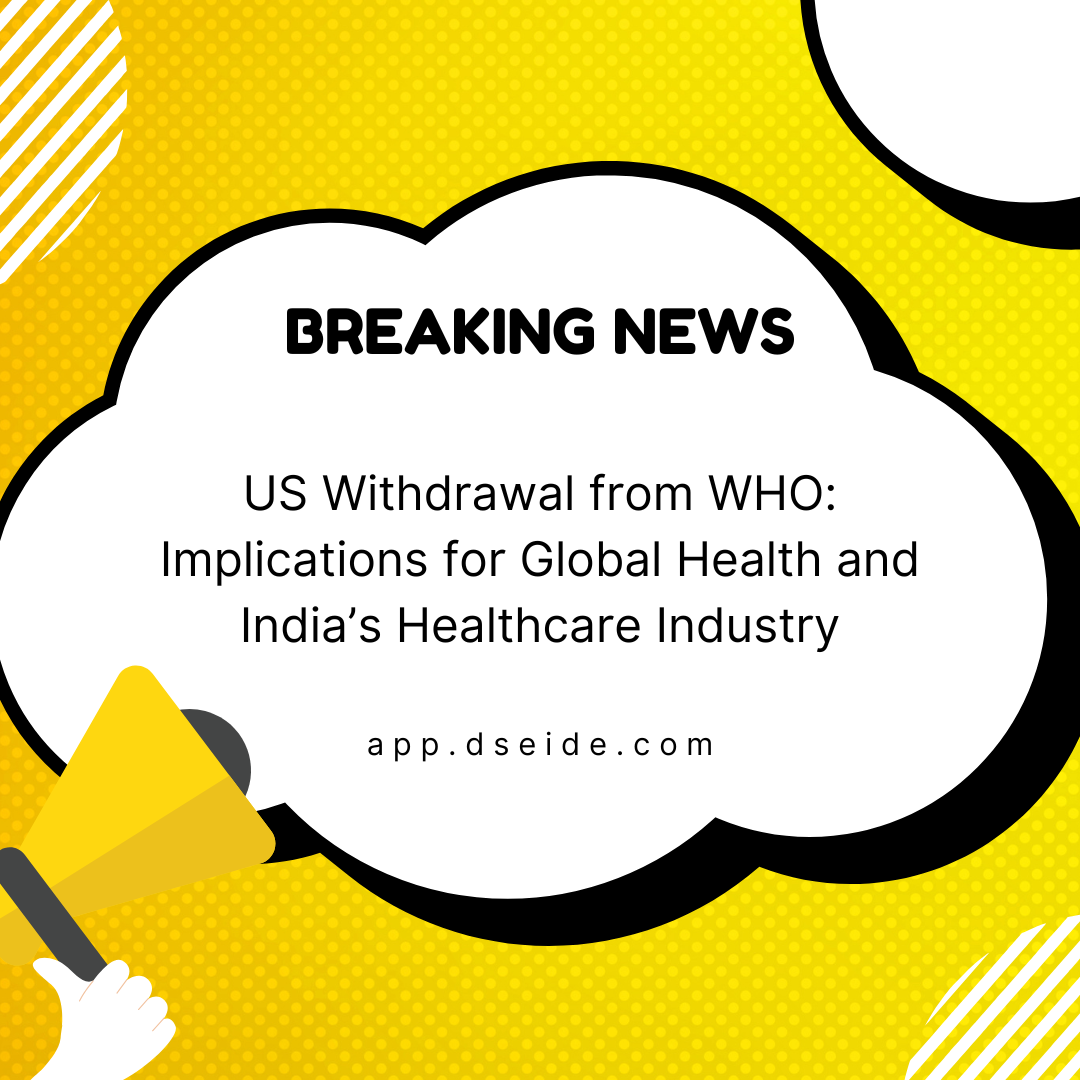In a significant policy shift, President Donald Trump has signed an executive order initiating the United States' withdrawal from the World Health Organization (WHO) for the second time in less than five years. This decision, announced on January 20, 2025, has profound implications for global health initiatives and India's healthcare industry.
Global Health Implications
The U.S. has been a major contributor to the WHO, providing nearly $1.3 billion over two years until 2023, accounting for about 15% of the organization's total funding. The withdrawal entails a 12-month notice period during which the U.S. will cease funding and reassign federal personnel involved with the WHO. This move raises concerns about the WHO's capacity to manage international health crises, including pandemics and diseases like AIDS, malaria, and tuberculosis. Experts warn that the absence of U.S. support could undermine vital health programs, disrupt international collaborations, and hinder responses to global health emergencies.
The WHO has expressed regret over the U.S. decision, emphasizing the longstanding partnership that has led to significant health milestones worldwide. The organization highlighted its crucial role in combating diseases such as Ebola and polio, particularly in underprivileged regions.
Implications for India's Healthcare Industry
India, as a significant player in global healthcare, could experience both direct and indirect effects from the U.S. withdrawal. The WHO collaborates closely with Indian health authorities on various programs, including immunization drives, disease eradication efforts, and health system strengthening. Reduced funding and support may lead to scaling back of these initiatives, potentially impacting public health outcomes.
Moreover, India's pharmaceutical industry, known for its substantial generic drug production, benefits from WHO prequalification programs that facilitate global distribution. Changes in WHO operations could affect the approval and export processes, influencing market dynamics and access to affordable medications worldwide.
Additionally, the U.S. withdrawal may alter global health governance structures, prompting India to reassess its role and contributions within the international health community. This situation presents an opportunity for India to take on a more prominent leadership position in advocating for and supporting global health initiatives.
In summary, the U.S. exit from the WHO introduces uncertainties in global health efforts and poses challenges for India's healthcare industry. It underscores the need for sustained international collaboration and support to address health challenges effectively.
Source: eHealth
#USWHOWithdrawal #GlobalHealthCrisis #WHO #HealthcarePolicy #PublicHealth #IndiaHealthcare #HealthDiplomacy #TrumpPolicy #MedicalImpact #HealthSecurity #PandemicPreparedness #PharmaIndustry #GlobalHealth #dseidehealthcarenetwork
Global Health Implications
The U.S. has been a major contributor to the WHO, providing nearly $1.3 billion over two years until 2023, accounting for about 15% of the organization's total funding. The withdrawal entails a 12-month notice period during which the U.S. will cease funding and reassign federal personnel involved with the WHO. This move raises concerns about the WHO's capacity to manage international health crises, including pandemics and diseases like AIDS, malaria, and tuberculosis. Experts warn that the absence of U.S. support could undermine vital health programs, disrupt international collaborations, and hinder responses to global health emergencies.
The WHO has expressed regret over the U.S. decision, emphasizing the longstanding partnership that has led to significant health milestones worldwide. The organization highlighted its crucial role in combating diseases such as Ebola and polio, particularly in underprivileged regions.
Implications for India's Healthcare Industry
India, as a significant player in global healthcare, could experience both direct and indirect effects from the U.S. withdrawal. The WHO collaborates closely with Indian health authorities on various programs, including immunization drives, disease eradication efforts, and health system strengthening. Reduced funding and support may lead to scaling back of these initiatives, potentially impacting public health outcomes.
Moreover, India's pharmaceutical industry, known for its substantial generic drug production, benefits from WHO prequalification programs that facilitate global distribution. Changes in WHO operations could affect the approval and export processes, influencing market dynamics and access to affordable medications worldwide.
Additionally, the U.S. withdrawal may alter global health governance structures, prompting India to reassess its role and contributions within the international health community. This situation presents an opportunity for India to take on a more prominent leadership position in advocating for and supporting global health initiatives.
In summary, the U.S. exit from the WHO introduces uncertainties in global health efforts and poses challenges for India's healthcare industry. It underscores the need for sustained international collaboration and support to address health challenges effectively.
Source: eHealth
#USWHOWithdrawal #GlobalHealthCrisis #WHO #HealthcarePolicy #PublicHealth #IndiaHealthcare #HealthDiplomacy #TrumpPolicy #MedicalImpact #HealthSecurity #PandemicPreparedness #PharmaIndustry #GlobalHealth #dseidehealthcarenetwork
In a significant policy shift, President Donald Trump has signed an executive order initiating the United States' withdrawal from the World Health Organization (WHO) for the second time in less than five years. This decision, announced on January 20, 2025, has profound implications for global health initiatives and India's healthcare industry.
Global Health Implications
The U.S. has been a major contributor to the WHO, providing nearly $1.3 billion over two years until 2023, accounting for about 15% of the organization's total funding. The withdrawal entails a 12-month notice period during which the U.S. will cease funding and reassign federal personnel involved with the WHO. This move raises concerns about the WHO's capacity to manage international health crises, including pandemics and diseases like AIDS, malaria, and tuberculosis. Experts warn that the absence of U.S. support could undermine vital health programs, disrupt international collaborations, and hinder responses to global health emergencies.
The WHO has expressed regret over the U.S. decision, emphasizing the longstanding partnership that has led to significant health milestones worldwide. The organization highlighted its crucial role in combating diseases such as Ebola and polio, particularly in underprivileged regions.
Implications for India's Healthcare Industry
India, as a significant player in global healthcare, could experience both direct and indirect effects from the U.S. withdrawal. The WHO collaborates closely with Indian health authorities on various programs, including immunization drives, disease eradication efforts, and health system strengthening. Reduced funding and support may lead to scaling back of these initiatives, potentially impacting public health outcomes.
Moreover, India's pharmaceutical industry, known for its substantial generic drug production, benefits from WHO prequalification programs that facilitate global distribution. Changes in WHO operations could affect the approval and export processes, influencing market dynamics and access to affordable medications worldwide.
Additionally, the U.S. withdrawal may alter global health governance structures, prompting India to reassess its role and contributions within the international health community. This situation presents an opportunity for India to take on a more prominent leadership position in advocating for and supporting global health initiatives.
In summary, the U.S. exit from the WHO introduces uncertainties in global health efforts and poses challenges for India's healthcare industry. It underscores the need for sustained international collaboration and support to address health challenges effectively.
Source: eHealth
#USWHOWithdrawal #GlobalHealthCrisis #WHO #HealthcarePolicy #PublicHealth #IndiaHealthcare #HealthDiplomacy #TrumpPolicy #MedicalImpact #HealthSecurity #PandemicPreparedness #PharmaIndustry #GlobalHealth #dseidehealthcarenetwork





